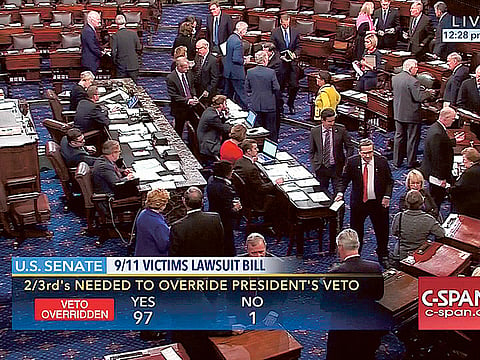What’s wrong with Jasta?
The 9/11 law allows for many Americans to be sued for actions embarked upon by their government. The list of countries that can enact such legislation is truly long

Foreign policy made by attorneys is bound to lose sight of what matters for the sake of short-term gains, and while US President Barack Obama vetoed the Justice Against Sponsors of Terrorism Act (Jasta) bill, Senators and Congressmen overrode it. Regrettably, Obama — a lawyer too — did not fight to save this veto though he chastised those who catered to 9/11 families, who are persuaded that Saudi Arabia was behind the attacks even though the official 9/11 Commission said otherwise.
For months on end, men like former senator Bob Graham, who headed the Senate Intelligence Committee that compiled a classified report in 2002, alleged that Saudi officials provided assistance to the 9/11 hijackers. When the mysterious 28 pages were finally released, Saudi Arabia was duly cleared, once again, of any responsibility.
Still, that did not matter because hungry attorneys looked for fresh political/financial bait, instead of assuming their governance responsibilities. What are the consequences of Jasta and who will really pay the ultimate price?
Let there be no doubt that Jasta was promoted to squeeze Riyadh and Saudi citizens for putative terrorism allegations even if Washington opted to overlook a designated state sponsor of terrorism, Iran, when it rushed to sign a nuclear deal with the latter a few months ago. Senators and Congressmen who went in front of television cameras to condemn the kingdom assumed that no one is paying attention and, even worse, rushed the Jasta Bill without much of a debate. That is, unfortunately, not an unusual phenomenon, since lawmakers seldom read most of their own bills.
Bizarre twist
Be that as it may, Jasta opened a Pandora’s box because the law targets everyone, not just the kingdom. In what must truly be a bizarre twist, Jasta also targets the United States, which the intrepid lawmakers overlooked in their zeal to exact revenge on what is a highly contentious matter.
How is the US a target? Simply because Jasta abrogates the principle of sovereign immunity, a necessary change in the law to allow an American citizen to sue a foreign government in a US civil court, and which will now be easily replicated by other governments. This is a double-edged sword as foreign governments and citizens, for example in Japan over the Second World War attacks at Hiroshima and Nagasaki, or in Iraq for the 2003 occupation and the many unlawful killings that occurred there, will now retaliate with their own versions and force Washington into their courts for sponsoring terrorism. The list of countries that can presumably enact such legislation is truly long and must include Afghanistan, Syria, Yemen and many others.
The idea that US lawmakers would so cavalierly forego sovereign immunity is mind-boggling and can only mean that these attorneys are simply not qualified to stand in a courtroom, although few bother with such details since they cater to a much larger audience: reality television that produces such luminaries as Kim Kardashian and Donald Trump.
Jasta is bad news for Americans not only because many will be sued for actions embarked upon by their governments over the years but also because it now adds a new component to the conduct of international affairs, namely various judiciaries whose rules and regulations might be — and often are — diametrically opposed to those adopted by leading western powers. One can only imagine a Russian judge rendering such a decision in a case that may involve a US diplomat.
A very expensive vote
Of course, Senators and Congressmen who backed Jasta are hungry for cash and believe that Saudi Arabia has a lot of assets that can be confiscated, without realising that the US has far more. Their most recent vote may turn out to be quite expensive and reminds one of the famous words uttered by former Secretary of State James A. Baker III at the United Nations Security Council meeting in late 1990, when Baker famously told Ambassador Abdullah Al Ashtal that he was about to cast “the most expensive ‘no’ vote ever”, as Washington promised to end US aid to Yemen after President Ali Abdullah Saleh stood with Saddam Hussain in the invasion of Kuwait.
Anti-American US Congressmen cast their most expensive votes ever too as Riyadh might unpeg the dollar from the riyal, diversify its economy, sell some of the $117 billion (Dh429.7 billion) of US Treasuries and liquidate an estimated $600 billion in other assets to keep them from being frozen by US courts. Ironically, 9/11 families did not need Jasta because existing laws allow citizens to sue in courts, as demonstrated by the indictment of Iran over the Khobar Towers bombings that awarded over $2 billion to victims and their families. Interestingly, the Obama Administration did not support those judgements for political reasons, and there is a lesson here for Jasta backers: the White House has not allowed payments to the Khobar Towers victims from Iran’s frozen accounts, which means that a future administration might do likewise if we ever get that far.
Before anything else occurs, however, US courts will need to find Saudi Arabia guilty of sponsoring terrorism.
This is an impossible task because Riyadh was and is the primary victim of terrorism. It also is a staunch American ally at a time when such partnerships are tested by ambulance chasers.
Dr Joseph A. Kechichian is the author of the just-published From Alliance to Union: Challenges Facing Gulf Cooperation Council States in the Twenty-First Century (Sussex: 2016).


